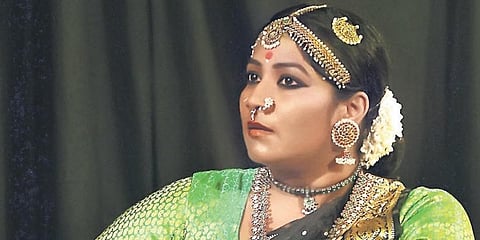

CHENNAI: In matters of hereditary identity in the realm of Bharatanatyam, there are two positions that people stick to, according to dancer Nrithya Pillai. “One is from the insular dance world where people completely do not involve themselves in this narrative of appropriation. Then, you have a set of people who call themselves ‘anti-caste’ and refuse to see the patriarchal mindset that fuelled the reformation movement,” she explained.
These are the two sets of people she wants to reach out to with her work — a mission to repopulate the dance world. She begins this epic by forging a conversation about the politics of the dance form and bringing to light the very real struggle that women of the Isai Vellalar community, a section of descendants of the Devadasis of yore, face even today.
“We still have people who are talking about one dancer from a marginalised background — Kali Veerapathiran — and that is still news for us. If you ask them why the reform took place — to democratise art. How can that be? Where is that reality and where is the truth of that claim? That is something that everyone should ask but no one is willing to,” she summed up, after presenting a talk on Hereditary Identity, Performance and Politics of Bharatanatyam to a rapt audience at the Roja Muthiah Research Library on Saturday.
Nrithya wants to turn everyone’s attention to the life of present-day women who were not assimilated into the system. “A few women who refashioned themselves as ‘good wives’ during the reform period were singled out as exemplary Devadasis. But a vast majority of Devadasis could not be integrated into India’s emerging middle class then,” she said.
Drawing upon the writings of social historian Davesh Soneji in Unfinished Gestures: Devadasis, Memories and Modernity in South India, she talked about how women’s marginalisation is evident in the families of such integrated individuals. “The fact of the matter is that legislation (to keep Devadasis from performing their art in public and private spaces) did not eradicate this community. Today, young women like me from the community lead complex lives,” she pointed out.
New identities
Her talk also covered the rise of the self-respect movement in the south, in answer to Brahmanic hegemony and power constructs, and how this allowed Devadasi men to create a new identity for themselves — Isai Vellalars. “While this new caste identity afforded social possibilities to men, it cloaked the older caste for women. Everyone knows who an Isai Vellalar woman is,” she said.
While Nrithya has been spearheading this narrative and has been calling out for the need to break down the power structures within the dance world for quite a while now, she has very little support from fellow dancers. She isn’t surprised.
“It inconveniences them. To accredit this is to question the system and what we today call as history. It will topple the complete hierarchy of power. No one is willing to do that. Who are dancers we see today? People with power — political, monetary, social capital and caste capital,” she noted.
While she has found success in reaching out to the young dancers in cities like Bengaluru, the dancers of Chennai are in complete denial. “To acknowledge me would also mean they would be losing out on their privileges. So they wouldn’t do that and I don’t expect them to,” she said. But her work is far from over.